Cancer is a word that strikes fear in the hearts of dog owners. As human cancer deaths rise in the United States, you may wonder if a similar phenomenon is happening in our canine companions. According to veterinary oncologist Dr. Stacy Binstock, estimates show that 25%-33% of dogs will have cancer at some point in their lives. It is the number one cause of death in older dogs. Those are sobering statistics. The good news is that you can help with early cancer detection and early treatment of your dog.
The first step is semi-annual or annual examinations with your veterinarian. These are not just vaccine appointments. A visit is needed for a thorough physical examination. Your veterinarian will check your dog’s weight, vitals, lymph nodes, heart and lungs, palpate the abdomen, and perform a rectal exam. These are all essential to early detection of illness. Weight loss may be the first sign and can be easy to miss at home. Secondly, as your dog ages, your veterinarian will likely recommend bloodwork, urinalysis, and other diagnostics. These can detect changes in organ function, possibly indicating cancer.
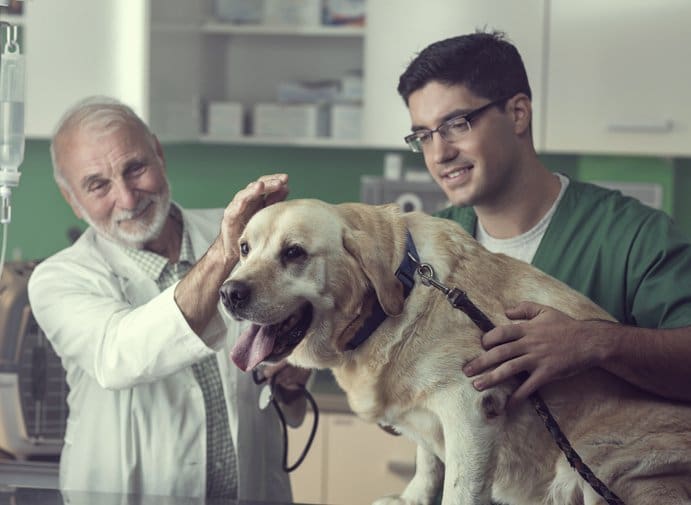
Types of cancer in dogs are varied and include skin, orthopedic, blood, and bone malignancies. As a result, the symptoms differ wildly and depend on which system is affected. The four most common cancers and their clinical signs are listed below.
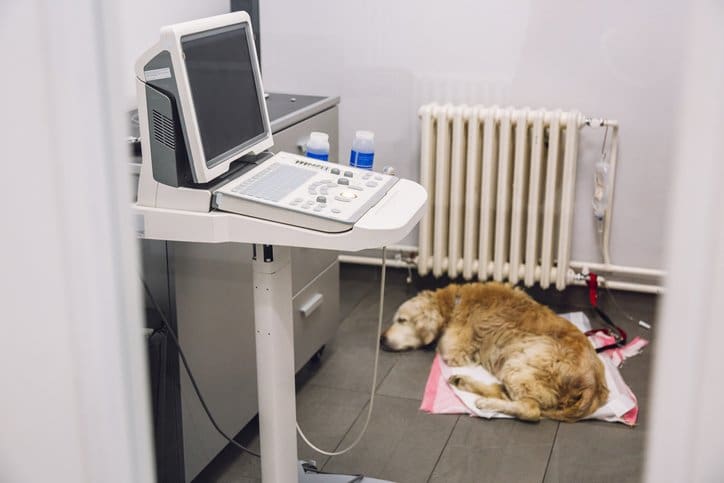
Lymphoma. This is a frequently diagnosed cancer in dogs. It can originate in the lymph nodes, bone marrow, or organs like the spleen. The first signs may be very vague and often include large knots that are palpable under the jaw, behind the elbows, and behind the knees. These are all locations of lymph nodes that can enlarge with cancer. Other symptoms may include lethargy, weight loss, and increased drinking and urinating.
Osteosarcoma. This is a type of bone cancer seen often in large breeds such as Great Danes and Wolfhounds, although it can occur in any breed. Osteosarcoma typically grows silently at the end of a bone (called the diaphysis) until the bone is severely weakened. Early symptoms may include swelling and tenderness. Often, there are no symptoms until the tumor destroys the bone enough to cause a fracture. When this happens, your dog may suddenly be unable to walk on the affected leg and demonstrate signs of severe pain.
Hemangiosarcoma. Another type of cancer that often has no obvious clinical signs is hemangiosarcoma. These tumors can grow anywhere—on the skin or in the spleen, liver, or other internal organs. In dogs, it is most frequently encountered in the spleen, liver, or heart. Usually, no signs are noted until the tumor grows very large and ruptures. This sudden, catastrophic rupture leads to internal bleeding, weakness, and collapse.
Mast cell tumor. Boxers are especially prone to these skin malignancies. Mast cells are normally found in the skin and react when an allergen is introduced. They are filled with histamine and other substances that are released in an allergic reaction, leading to the formation of hives. Unfortunately, cancer can arise from these cells. The hallmark of an MCT is a growth on the skin that waxes and wanes in size and character. They can be small and “quiet,” or they can become large, inflamed, and weep fluid.
Always observe your dog carefully for any changes. Any skin masses or lumps that you palpate should be checked out by your veterinarian sooner rather than later! Remember, early detection is critical in catching and treating cancer.


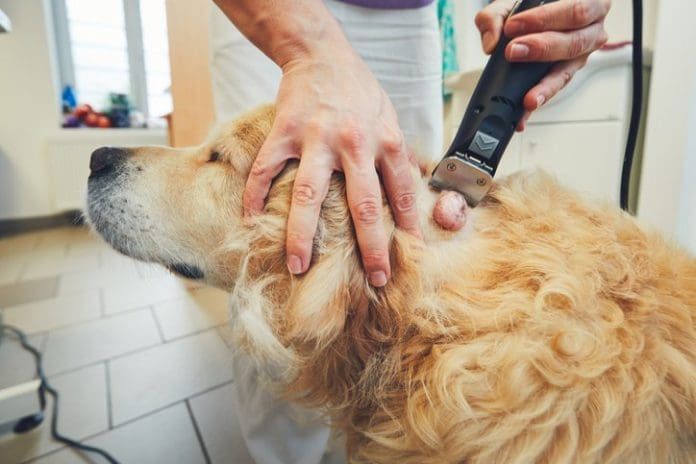
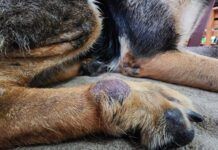

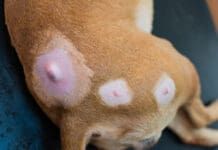

We lost our Lab to cancer when he was 11 yrs. old. He had a tumor in his anal gland that was never detected until it was to late, because our vet at the time never did an anal exam on him when Bruin had his yearly exam. Needless to say, we no longer use that vet. Since Bruin was raised holistically and fed raw, he was never ill in his entire 11 yrs, until the last 3 weeks of his life.
Your story is heartbreaking. Definitely, I’ve never heard of this before but its always good to know. May u find peace in knowing that he lived a good life!
We lost our golden retriever Baxter to an anal gland tumour as well. Baxter was 12 yrs. old and we are so thankful he lived a good life until then. His tumour was detected in his annual exam but unfortunately even with treatment this type of tumour is fatal. So sorry for your loss…it is never easy no matter how prepared we think we are.
How do you know your dog has cancer on his annus
I went though the same thing with my Lab. She was 11.1 years of age. So sorry for your loss. It’s been a year since mine has been gone. Miss her every single day!
I just lost my Maltese to metastatic anal cancer. Her mets were to the spleen. We didn’t realize it had progressed until she started having neuro signs like circling and lump hind quarters, so it probably was brain and spine as well. She did have a large tumor in her abdomen as well. It’s heartbreaking!
We lost two dogs to splenetic cancer and I do not think it is unrelated that GMO corn was growing in the fields next to our pasture. We adopted an elderly beagle (a breeding dog when she was young) who had a very small mammary tumor which suddenly began to grow exponentially. Even our holistic vet was unaware of iodine and its efficacy in treating mammary tumors. I now follow Dr Brownstein’s formula for determining iodine dosage for dogs as we adopted a German shepherd who had been used for breeding. Both our dogs receive 5mg of iodine daily using Lugol’s solution, which will prevent their bodies taking up chlorine, fluorine, and bromine which then attach to iodine receptors if they are iodine-deficient. And I am happy to say that a man bought the land next door and has worked hard to help the land recover from the GMO (Roundup-ready) corn, Roundup essentially sterilizing the soil.
Would giving iodine to a 10 yr. old AK. Husky who had a mammary adenocarcinoma temoved 1 yr. ago help in preventing it’s reoccurrence? She is on thyroid med at present. Unfortunately I was told they had done “narrow margins” with the tumor removal.
Thank you
My Lab has mast cell. Saw the vet regularly as we have three other pets. Wasn’t until she tore her ACL that the tumor was aspirated. We had three surgeries and decided not to increase her stress. Fed the same food we’ve used for 29 years. All lumps need to be checked.
My boxer girl had a torn ACLU, and I opted to try something other than surgery. I am happy to say it worked. Contact Joyce, at Herbsforlife.com. Joyce is a herbalist..
Terri Farless
thank u… my dog in the course of 11 months tore both of his CCL’s. I opted for conservative management.
Same food really isn’t. Brand, maybe, but ingredient quality has changed over years. Many more chemicals, contaminants now.
Had a Bouvier-mix with MCT and a Collie with hemangiosarcoma about a year later. Thanks to pet insurance, both were successfully treated and went on to live long lives (15 and 11 respectively.) Early detection of anomalies by me and a great veterinarian were key.
Hi kathi. Who do you use for pet insurance? Thank you
Petplan has been fantastic!
I find them to unreliable and would never buy from them again. There are so many better companies that have surfaced
Hi kathi. Who do you use for your pet insurance ? Thanks
What food do you feed your dogs?
Keto foods such as KetoNatural
What pet insurance do you have?
Checkout petinsuranceuniversity.com for what to consider when getting pet insurance & comparison of different plans.
Peggy what systom was your having in the anal gland that the vet decided to check?
GMO- genetically modified organisms – has nothing to do with a general use herbicide like round up. And dogs don’t usually eat corn on their own. They don’t digest it (neither do we) and it’s not something they seek out on their own. Menadione which is found even in premium dog foods, is toxic to dogs and people. It’s one of the poisons used in chemo.
Mari H Haget Presedo- GMO has EVERYTHING to do with Round-up! That’s why they have gone to GMO so that they can spray a fiend with Round-up (Glyphosate) to kill all the weeds but not the plant itself, therefore the plant is absorbing all the Roundup and not dying, they harvest it and anything that eats it will get a dose of Cancer causing Glyphosate! It has been proven, it is a VERY dangerous herbicide and what’s worse is Monsanto even knew that it caused cancer but sold it as safe. He is getting law suits from everywhere because of it,
Kathi, you had a dog treated successfully for hermangiosarcoma? Who is your vet? He must have published a paper on it somewhere and I would love to read and share with colleagues. Can you please share?
I would like to know that too. I lost my dog to hemangiosarcoma last year. It is a aggressive and horribly cancer. I didn’t think a dog could recover from that.
See my post below. I have never heard of a dog who recovered from hemangiosarcoma and if there had been I agree it would have been published in a paper. The tumors compromises their blood vessels leading to the dog bleeding out. Also, I’m not aware of any way to detect the tumors in advance, you would have to do exploratory surgery on the dog. to see the tumors.
My dog died of liver cancer, The vet kept saying that he was well hydrated however he could not eat for days. No this vet never took his temper or used a stetascope on him. No I won’t go back there at all.
I lost a dog to cancer of the spleen. Did not show any signs that he was sick until it was to late. He stopped eating and walked slower than usual one day. Took him in the vet said that he only had a week to live and would be in a lot of pain and the vet was surprised that he was even moving. I had him put to sleep that very day. Saddest day of my life.
I’m sorry for your loss 😔
Same thing that happened to my beloved samoyed, I adopted. No signs at all!! On a Wednesday, he threw up, and laid around, didnt eat. I took him to the emergency room next morning, and he was dying on the table. It ruptured and his stomach filled with blood. They did a ultrasound. It happened APRIL 21, 2016. I’ve been sad ever since. I rescued him at 8 mos. He was almost 12. September 12, he would of been 12
I noticed my ten year old lab had a small growth on the hind quarter. My vet biopsied it and it was cancerous. She removed it and all capillaries. Last year my dog started having a very sensitive stomach. I started cooking for my dog. Organic meats, steamed veggies, and brown rice. I added vitamins and fish oil and joint medicine. She is now 12 and 1/2. And doing very well. She had another growth by the duclaw and we tested 4 months ago. Cancer free!👏👏. Now we noticed another small growth outside the anus. We are just watching. My dog was at vet today and had gained a few lbs. my advice-always check your dog and concerned about your dog food? Cook for your dog! It’s time consuming but worth it to give your special friend love. My dogs only have freeze dried treats.
Laurie, can you share your recipe with me? I just adopted a rescue knowing she would undergo cancer surgery. Ruby had a breast tumor (and gland removed), a lipoma from her side, and a cancerous growth from her elbow. Stitches come out thursday. I want to cook for her but would love a recipe to make sure she is getting what she needs. You can email me: anush@essentiallyanush.com
I had a 14 1/2 year old pup that died from metastatic carcinoma of the liver, pancreas and lungs! The only reason I took her to the vet, was she stopped eating one day. The vet said, just put her down. I left with my pup, and I gave her the best 9 days of unconditional love, including setting up a tent in the living room. That was one of her favorite things to do, sleep in the tent. And needless to say, I have never gone back to that heartless vet!
I had a twelve year old Golden who was always healthy. I took her in for her yearly exam and the vet suspected liver cancer. So, she had all the diagnostics and the vet confirmed it was liver cancer. I asked if they were sure because she was still very active and didn’t seem ill to me. But, they told me when it’s time, it will hit fast. So, one day she started peeing blood. I called the vet and she said this was a sign that this was the end. So, not wanting her to suffer we had her put to sleep. I asked for all her records and upon reading them, they stated they were 95% sure they had the right dog. Records may have been mixed up with another dog. Upon reading that, I was so guilt ridden. I trusted my vet, but now I questioned her. For all I know, it could have been a urinary tract infection. I should have gotten a second opinion, but I really trusted this vet. Needless to say, I will always seek out a second opinion and I severed ties with this vet. To this day I still am so sad and feel so guilty that I didn’t get another opinion. We cried for a long time over the loss of our beloved girl.
We almost two weeks ago put our 14 year old GR down at the Vet’s recommendation. He felt with symptoms and how she looked she had cancer. She was weak, had been losing weight and had some vomiting a while back and once on first visit. That visit did not diagnose cancer but next visit was 11 days later with more decline, weakness, poor appetite and incontinence and inability or too weak to try to get up to go potty. This was when he diagnosed cancer but no xrays or scans. Now she is gone and I have regret, pain and loss and am not sure it was cancer or not. Diane
We lost two dogs to cancer in 2017. The younger dog was 6 y.o. when she was disagnosed with lymphoma. Enlarged lymph glands in her neck appeared suddenly and she had her first chemo treatment within 5 days. She had 4 months of weekly chemo, exhausting all options in our city, our specialist referred up to a US animal cancer clinic for further treatment. Sadly, it was an especially virulent form of lymphoma and she was never able to go into remission. If there was anything positive in this experience, she never knew she was sick. She tolerated the chemo extremely well, had only a slight reduction in her energy, no issue with appetite, and was her happy, outgoing self until 24 hours before she died. The other positive was that our pet insurance covered 90% of the treatments, which averaged about $500/week. Our other dog, a 14 y.o., died nine weeks later of histiocytic sarcoma, and, we think, grief over the loss of his companion. Given the survival rate even with chemo, we opted to put him on prednisone which reduced his pain and he was able to go walking, socializing and be his sweet self until his last couple days. Cancer is a terrible, vicious, heartbreaking disease for animals and humans and we need to support research that will find ways of preventing and treating it.
Had similar experience with my seven and eight-year-old dogs died from malignant lymphoma. That was heartbreaking and will turn your life upside down. How can I not believe something in home environment or perhaps food for both to have same cancer within 1 year of each other ?
Hi Kimberley how did your dogs present with their Lymphoma? See my post above under Diane A
Jane what health insurance did you have?
Try Trupanion insurance for your pets. They have a one time deductible per illness (no annual deductible). IF you get the plan as a puppy, you pay puppy rates for the life of the dog (no increases unless they raise the rate of puppy).
Donna I agree, I use Trupanion since my 3-yr-old was a baby. I’ve heard great things from others who use them as well.
Try Trupanion insurance for your pets. They have a one time deductible per illness (no annual deductible). If you get the plan as a puppy, you pay puppy rates for the life of the dog (no increases unless they raise the rate of puppy).
We lost our 13yr old Keeshond to stomach cancer. We had trupanion insurance and they were great-so easy to work with and very caring. We will certainly use them again
We lost 2 labs, sisters to cancer. They were 13 years old. I had found them thrown away as 4-month old puppies. Bella and Izzy were amazing dogs, always happy, very smart and loving.
Bella had hemangiosarcoma, Izzy has mast cell cancer in her nose, inoperable.
They got chemo and died within a month of each other….
I still miss them. My husband called them the “Babyloves”….
aww poor babies. sounds like you loved them very much!
I have had three flat-coated retrievers die of hemangiosarcoma, and two of them died just three weeks apart. Typically the tumors attach themselves to blood vessels feeding blood rich organs such as the liver or heart, causing the blood vessels to weaken and rupture. There is no treatment and no early warning signs. My dogs appeared to be perfectly healthy one minute and collapsed the next. It is a devastating form of cancer and a very nasty way to go.
Also, when my first dog died of hemangiosarcoma, the vet did blood work on my other flat-coat at my request, and the results were normal. Three weeks later he collapsed and died.
Has anyone had a dog been diagnosed with Hemangiopericytoma? my vet removed a plum-sized mass from Sawyer’s left leg at the knee, When the pathology came back it was classed as Stage one. How fast does this type of cancer progress?
Have lost one cocker spaniel to hermangiosarcoma only 3 months after a complete and thorough physical. His spleen ruptured and he could not be saved. Many years prior I had a cocker with hermangiosarcoma within the spleen. We went to a University Veterinary Hospital where she was diagnosed, but said they could not operate and gave her a short time to live. My veterinarian was willing to try the surgery although there were great risks. He successfully removed her spleen without it rupturing and she lived to be 15. She was nine when diagnosed, the exact same age as my cocker who did not survive. With the first cocker who also suffered bouts of pancreatis, I started cooking for my dogs and have been doing so for many years now. It is NOT that much trouble – once you determine the best foods for your dog, just make a week’s worth of food at one time, refrigerate and you’re set for the week.
I have 3 pets and I use aspca pet insurance I can’t say how much they have help me.
Cancer in dogs can be gotten from the chemicals we put on our lawns, weed and feed, etc also the horrific chemicals we put on and in their bodies, flea and tick products! Also over vaccinating! A lot of vaccines are made by Monsanto! Read the ingredients and warnings. All these products are destroying our dogs immune system and can be a huge contributor to cancer.
How do you know your dog has cancer on his annus
I have a 2 year old. He has a mass in his mouth and we were abler to get it removed but now it’s growing on his snout. He’s so young and it’s terrible what he’s going through. I’m not sure what to do. Does anyone have information on how I can get the costs lowered? I’ve already used my care card.